|
|
| ISOC-1 Opening Plenary |
 Làslo Miklós
(Slovakia), President of COP-4, opened the session. He highlighted
COP-4 concerns regarding measures to improve the CBD's operation. Làslo Miklós
(Slovakia), President of COP-4, opened the session. He highlighted
COP-4 concerns regarding measures to improve the CBD's operation. |
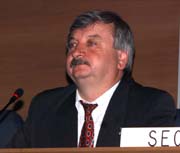 |
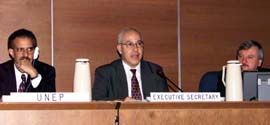
|
 Hamdallah
Zedan, Acting Executive Secretary of the CBD (center), noted that
the Convention will only achieve its goals through effective management
and organization. Hamdallah
Zedan, Acting Executive Secretary of the CBD (center), noted that
the Convention will only achieve its goals through effective management
and organization. |
| Jorge Illueca, UNEP, on
behalf of the UNEP Executive Director Klaus Töpfer, wished participants
a successful meeting. |
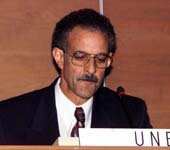 |
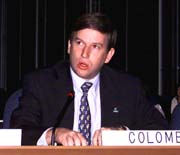 |
Cristiàn Samper (Colombia), Chair of
SBSTTA-5, highlighted improvements made during SBSTTA-4, including:
a more focused agenda and proposal to hold two SBSTTA meetings between
each COP; three presentations by leading scientists to introduce topics;
and the establishment of staggered Bureau members' terms to facilitate
continuity. |
| CANADA supported incremental
rather than radical change of Convention operations. |
 |
 |
GERMANY, on behalf of the EU, noted
the importance of agenda setting, reporting and notification, and
he suggested holding annual SBSTTA's and bi-annual COP's. He expressed
preference for making the CBD's existing structures work better than
fundamentally changing them, such as through a new subsidiary body. |
| The PHILIPPINES stressed
the need for full cooperation by all participants in a transparent
manner, especially regarding capacity-building, financial and budgetary
issues. |
 |
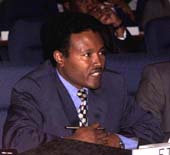 |
ETHIOPIA, on behalf of the African Group,
said the CBD should work closely with other multilateral agreements,
including Ramsar and CITES, to gain from their experience and to avoid
duplication. |
| INDIA supported yearly
SBSTTA meetings and bi-annual COPs. He also supported establishing
a limited number of specific expert panels, which they said should
be transparent and have equitable geographic representation. |
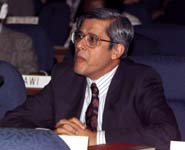 |
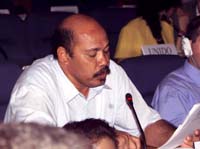 |
TONGA stressed the need to incorporate
regional processes and meetings prior to COPs and SBSTTAs. |










